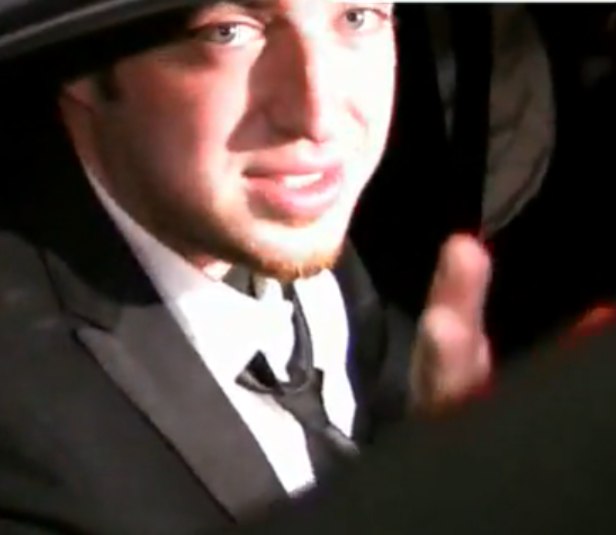M.I.A.'s New Protest Tactic: Inciting Prank-Call Flash Mobs

M.I.A. is apparently not happy with the profile of her in this Sunday’s New York Times Magazine, in which Lynn Hirschberg engages in a pretty meticulous takedown of the pop provocateur’s cannily crafted image. (Sample line, in which M.I.A. is responding to criticisms that her overheated take on the Sri Lankan civil war is simplistic and damaging: “’I kind of want to be an outsider,’ she said, eating a truffle-flavored French fry.” There are also lots of descriptions of the clothing M.I.A. wears.) M.I.A.’s response to the profile: a Tweet containing a phone number and the message “CALL ME IF YOU WANNA TALK TO ME ABOUT THE N Y T TRUTH ISSUE, ill b taking calls all day bitches ;)” The winky? Is likely there because the posted phone number actually belongs to Hirschberg. This seems like a bit of a petulant stunt — not to mention something of a tacit admission that the piece maybe cut too close to the bone, no?
Big Boi, "Shutterbugg"
The video for “Shutterbugg,” the spry new-ish single from Big Boi’s forthcoming Sir Lucious Left Foot: The Son Of Chico Dusty, is pretty bare-bones (guess the Crown Royal sponsorship cash wasn’t that much), but that doesn’t make the clip any less fun: there’s a lighthearted decapitation of Big Boi, a couple of Tron-costumed dancers making with the futuristic sexytime, and a wall display of Solo cups that you probably shouldn’t recreate at your next keg party because it would probably last 15–20 minutes before turning into a heap of brightly colored plastic. [Via]
Filmed School
Filmed School
Scouting NY takes a look inside the most photographed lecture hall in America: The Charles Follen McKim-designed Room 309 at Columbia University’s Havemeyer Hall, which you may remember from Ghostbusters, any of the Spider-Man flicks, or Malcolm X.
Inside "American Idol": Flesh Against the Barricades
by Natasha Vargas-Cooper

It gets messy in the Idoldome. But all of the mania happens on stage, not in the audience. The colossal disco lights create a dizzying swirl. Fifteen-foot sheets of white fabric are propped up by a hurried squadron of grips. A pack of deposed Idols appears. They are chunkily boxstepping and no one can answer the question “How deep is your love?” Cameramen circle the 12th place and 4th place contestants as they try to remain on key, then, black-out. Poof! Ryan Seacrest materializes on a massive rafter, the two-chord theme for the show booms over the speakers, a disembodied voice screeches “Two minutes!” A man in a rhinestone tie hustles the crowd to keep the energy up. “Where are you from? How long have you been 12-years-old? Here’s an iPod Touch!”
Audience approval. Tear the white walls down, then judges shuffle to their places between songs, look thoughtfully into the camera for a few seconds and retreat backstage. Look! Christina Aguilera is doing an uncanny Evita impression; the Idols, Hall, Oates, Chicago follow. (Who knows if it even is Chicago? Could just be tanned men in Bahama shirts? Who would know the difference? Troubling.)
Then, “Four minutes!” Alanis Morissette and Crystal Bowersox are criss-crossing the stage, chased by the merciless cameramen, Idols reappear, stammering, unsure where to look, their eyes dart around like they are 3rd graders at a holiday pageant waiting for their supportive teacher to queue them from the front row, but there is no teacher, only a quartet of women playing violins! Thirty seconds, and a skit goes wrong, eliminated auditioners come back to show their resolve and/or swallow more humiliation, tension fills the arena, they are rallied by more giveaways and touching slow motion montage courtesy of Ford Fiesta, sobs and hugs, Seacrest! Grips, fog, duet!
How does this transfer to the screen with such control? There are a few rough moments-closeups on empty chairs instead of the judges plaintive faces, some notes gone terribly flat-but that this is made into a TV show, this is a feat. The mechanical transfer of anxious pandemonium into precise minutes of television, compelling television at that, is astounding.
* * *
Except for the snakepit of glittery teen girls at the foot of the stage, all tube-topped and gangly, the audience is adult and sedate. They are engaged but not giddy, often needing to be coaxed from respectful applause to something more rousing. There are some radio contest winners scattered about-you can spot them by their home made signs (neon and delightful)-but many of the seats in the 7,000-capacity arena belong to employees of Ford and Apple, the corporate sponsors of our Idols. They were given the tickets. They did not buy them. They did not line up for them. So this was a crowd of observers, not participants.
* * *
Before the finale, the non-ticketed fans jostled for position at the press pool barricade. They were all female, most of them teenagers and younger. But between the tank-topped tweens who delighted in screaming the names of their favorites, their faces still too young to be painted, were women. Women over thirty-five elbowed their way through the frenzy with their own pleadings for signatures and snapshots of the Idols. Space is scarce at the barricades. Every space a woman takes up at the plastic barrier is one she denies a young girl. Being a teenager is sacred, it is not meant to be shared, most of your energies are spent on keeping adult invaders out. I don’t want to imagine the horror and confusion I would feel if I were a young girl pressed up against a woman twice my age-who had a driver’s license, was allowed to drink, knew what the stormy world of sex was actually like-and was forced to compete with her for the recognition of a newly-minted celebrity. That’s havoc on a teenage girl’s psyche. Then you know that the fantasizing that motivates a girl to cry at the sight of semi-famous person does not evaporate with age. How did they go to sleep with any security, knowing that they will probably never grow up?
Natasha Vargas-Cooper, at least, is sleeping it off.
Black Guy Can Say Terrible Things About The President Without Fear Of Being Called Racist
Alabama keeps ’em coming: Here’s congressional candidate Les Phillip, who wants to protect the nation from President Obama and his terrorist-palling, America-apologizing ways. While Phillip lacks the zest of Dale Peterson or the folksy, businesslike certainty of Tim James, he’s got a secret weapon: He’s black! It’s so great that this is finally something that could be considered a plus with conservative voters in Alabama.
The Half-Keyboard, For One-Handed Typing

Let your brain try this for a while. My brain entirely rejects it. (via.)
Hot Dogs To Become Slightly Less Deadly, Maybe

How to solve the deadly danger that lurks every time you eat a hot dog — namely, the possibility of choking on a tube that’s the same size as most human airways? The man who gave the world the popcorn chicken thinks that he has the answer! Gene Gagliardi has patented a device that will cut strategically placed slits into hot dogs — the incisions break up the dog into smaller, less fatal pieces upon mastication. (Well, less immediately fatal anyway — there’s still the whole matter of the dog’s nutritional value to deal with.) Also, Gagliardi is claiming that the cuts actually enhance the taste! “All the slits that open up, the flavors get in there, the condiments get in there,” he said, and I am wondering if the reporter on the other end of the line of that quote had to stifle a “that’s what she said” joke in response.
Kiddieporn Island Suffers From Low-Res Mobile Phones

Newcastle-upon-Tyne child porn enthusiast Michael Fraser left his cellphone on a bus, which led police to a “ring” of 70 fellow youth devotees, thanks to contacts in Fraser’s fifteen cellphones, six of which had “images” on them. First… who has fifteen cellphones? And more importantly, how enjoyable can porn be (kiddie or otherwise) if it’s only viewed on a Sony Ericsson W580i? That screen is all of 240×320 pixels! Poor England. There is an Apple store right there in Eldon Square in Newcastle, ya know. If your life is devoted to naked pictures of children, at least you could get an iPad, what with its glorious 9.7-inch diagonal display at 132 pixels per inch. And think how happy the Daily Mail would be to talk about “iPeds”!
The Shame of the Professor's Summer Vacation
by Kevin Dettmar

We’re looking at a modest vacation this summer, Robyn and me. Our oldest daughter and her husband live in Portland, Oregon; we’re going to take the better part of a week to drive lazily up the coast in a rental car, spend a few days with Emily and Blake, and fly home. Sounds pretty good right about now, as I’m scrambling to complete my grades for the spring semester.
Nine days: that will be the extent of our summer vacation this year. But honestly, that’s fairly luxurious compared to what many recent summers have looked like. I’m a college professor; and in the public imagination (or at least, my imagination of the public imagination), we’re supposed to have essentially three months’ vacation every summer. My experience has been rather different.
I grew up in an upper-middle-class family, the child of a professional man; my father was an attorney, then a judge, and we had a decent “disposable” income, and took serious vacations. Attorneys make no apologies for their vacations: in fact, quite the opposite. They work hard and play hard, and living well is the best revenge, as they say. So too, in my limited experience, doctors. I’ve often had my physician, or dentist, brag about his vacation; it seems to be part and parcel of his success, and I’m meant to feel proud that the guy probing the soft spots in my enamel takes upscale vacations. Damn, he must be good.
No so professors; at least, not so me. With my family, we’ve taken some mostly ramshackle vacations: a long weekend at someone else’s place, a shared condo at a lake, camping. As a graduate student and then young assistant professor, we didn’t have a lot of money, and these frugal holidays were simply a matter of living, and relaxing, within our means.
My brother-in-law was married on the beach in Maui a few summers ago-wait, no! It was five years ago!-and under some explicit family pressure, and with a bit of financial incentive from my mother-in-law, we Dettmars (all six of us) decided to go for a week. If not for the wedding, we never would have considered so lavish, so self-indulgent a holiday; indeed, when the wedding plans were announced, we had to postpone plans to stay with a retired colleague at his home in Maine. (For free!)
But today, along with my professional wife (physician assistant), twenty years into my career, we enjoy a good household income. As much, I’d guess, adjusted for inflation, as my father did; as much, certainly, as many public defenders and public health physicians do. But unlike them, taking a vacation-a “real” vacation, to a recognizable vacation spot-fills me with guilt and embarrassment.
Whither (or, ideally, wither), embarrassment? I’ve been thinking about it, and I think it comes down to this: when your job is “the life of the mind” (scare quotes as thick as you want ‘em), there really isn’t supposed to be any downtime. Take that impossible expectation, multiply it by the fact that most Americans think college teachers only work nine months a year, and the result is a mess of confusion, misunderstanding, and guilt. In the public imagination, the groves of academe are groves of privilege: and certainly, there’s a great deal of truth to that picture. But at the same time, there’s an awful lot of shame at work.
I’ve never discussed this with colleagues, but my understanding of the implicit rules of faculty vacations is something like this.
1. They must be cheap. Scholars, after all, do their work for the glory, not the money, and we’re meant to have none extra to burn. Extravagant vacations suggest that one isn’t serious enough about one’s work. (Similarly, for most of us, sartorial splendor is out. Some flashy colleagues get away with a more than thrown-together wardrobe; but for most of us, properly clothing the body suggests an insufficient dedication to the life of the mind. And I bet you thought we were all just fashion victims!)
2. If they’re not cheap, they must be work-related. Many scholarly organizations provide this kind of front for their members: the Beast Fable Society always seemed to me to have the best gig, meeting at various tropical locales for the summer months to share their research on-um, beast fables, I guess. Tahiti is absolutely forbidden as a vacation destination to the true scholar; but if there’s a conference-well, that’s altogether a different thing.
Thus London is available to scholars in my field, because the British Museum is there, and one might need to “do some research.” New York has the New York Public; Paris has the-uh, I’m sure it must have something that I need desperately to see. For my work.
3. If one insists on having a vacation then, by all means, be discrete about it. Indeed, if caught, or questioned, be ashamed. Be very ashamed.
4. One must pay for them by working that much harder in the weeks preceding and weeks following the vacation. That time off the clock can’t just be time off the clock: it must be compensated for somehow. Indeed, one perennial funding strategy is to teach summer school: six weeks of three-hours-a-day teaching will compensate both economically and sort of karmically for one’s frivolous outing.
Clearly, professors need to get a life. It is the nature of our profession-perhaps of all professions-that it has no very firm boundaries; certainly in the humanities, and I suspect in all disciplines, PhD students quickly learn that not only is theirs not a 9-to-5 job, but it’s a job that has no posted hours whatever. You always could, probably always should, be putting in more hours. The best people in our field can work very long hours; and a natural corollary of this, perhaps, is that we’re paid for nine months of work, but work all summer “for free.” Taking a vacation, of course, violates the spirit of this calling.
Part of this has to do with the relative invisibility of much of a professor’s work. If an engineer who makes my salary takes a real vacation, no one begrudges it her.
And here’s the dirty little secret of those vacationing professors: the summer, when we’re “off”? Don’t get too jealous. We’re also off the payroll. Professors work nine months a year, ordinarily; and we’re paid a nine-month salary. Many, probably most, of us choose to have that salary paid out in twelve monthly installments; certainly I always have, since I’m a terrible saver, and wouldn’t budget nine payments well enough to make it to the fall. But I work for my college for nine months a year, and I have a nine-month salary. Indeed, in contractual terms, I’m a nine-month employee.
So if we’re “off” all summer, we’re also unemployed. But wait, it gets better: because those three months when we’re unemployed are, for most of us, the most productive time of the year, in terms of our research. For those of us with significant teaching and/or administrative responsibilities, summer is the only time when we can turn our focus almost exclusively to that book project, or that research. Hence this central, animating paradox of the professor’s existence: the work that “counts” the most in terms of professional advancement-the work that is the real currency of the profession, the scholarly and creative work-is done when we’re off the clock and off the payroll. This is true even in a larger sense: that work is almost entirely done outside the 9-to-5 of the nine months we’re employed. One’s scholarly reputation, it’s not too much to say, is built as a form of moonlighting.
My grades now submitted, I’m “off” for three months: we’re back in class on August 30th. I’m eager to dive in; I’ve got a lot of reading and writing planned, as well, I’ll say without guilt, as a trip up the coast to see my daughter. Don’t begrudge me, gentle reader: I’m doing it entirely on my dime, and on my time-not yours.
Kevin Dettmar is W. M. Keck Professor of English and Chair of the department at Pomona College. He blogs daily on the delights of contemporary culture at Fake Chinese Rubber Plant.
